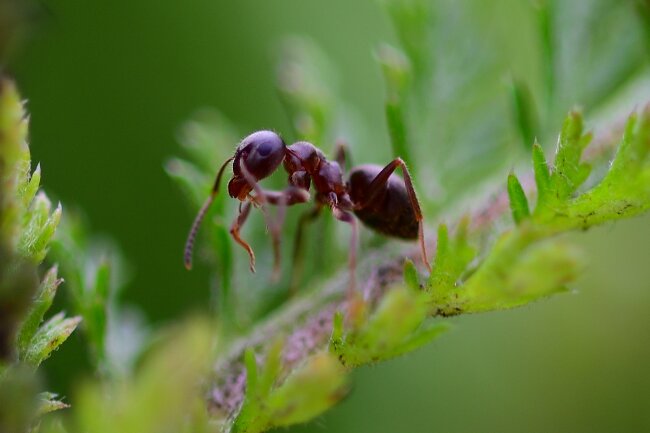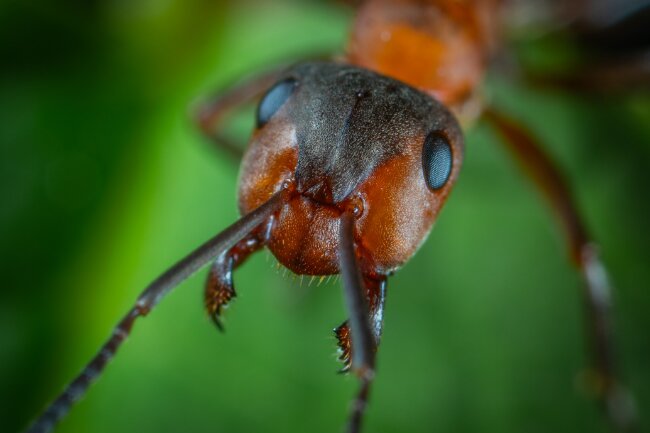Ants do not have lungs, instead, they have spiracles, which are holes on the outside of their exoskeleton, which allow oxygen into their bodies. The spiracles connect into a series of branching tubes called tracheae.
Contents
What are lungs?

Lungs are vital organs in the human body that help us to breathe. Most vertebrate animals have lungs, such as birds, fish, reptiles and mammals. Human lungs are composed of a spongy material and help facilitate the gas exchange required by our bodies to survive.
In essence, when we breathe in we bring oxygen into our bodies, which enters through our mouths and nose, down our throat, and into our lungs. From there, it infuses into our blood and is circulated around our bodies through our veins and arteries, providing oxygen to our organs.
On the reverse, when we breathe out, we expel waste gasses such as carbon dioxide. This process is known as gas exchange. Some gas exchange happens naturally through gasses entering our bodies through our mouth and nose, but the main method of bringing the gas in and out is through the contraction and relaxation of muscles around the lungs.
The key muscles are the diaphragm and the chest muscles. When we contract these we create a vacuum around the lungs and this pulls air in, and as they relax the lungs return to normal and the air is expelled.
Though lungs are such an important tool for our survival, many species do without them, from jellyfish to tapeworms. The way they do without them can be surprisingly varied and inventive.
How do ants breathe?

Ants do not have lungs, their bodies are too small to house this kind of respiratory system. Unlike us, ants don’t use their mouths and noses to breathe, in fact, they don’t even have noses, instead, they have a series of holes along their bodies called spiracles.
Spiracles allow air to enter the body at multiple points. This means that air can move into the ant’s body, without needing to be pumped in and out. Ants have around nine to ten pairs of spiracles across their body, depending on the species.
Unlike us, the ants do not move their muscles to draw air in and out of the body, instead, it is simple air pressure that diffuses it into the spiracles. The ant’s size means that this is a feasible way for ants to get enough air, whereas larger insects do require some kind of mechanism to pump air in and out.
| Organ | Description |
|---|---|
| Spiracles | Small openings on the ant’s body surface that lead to a network of tubes called tracheae. |
| Tracheae | Tiny tubes that deliver oxygen directly to the body tissues and remove carbon dioxide. |
| Spiracular Valve | Specialized muscles that control the opening and closing of the spiracles to regulate gas exchange. |
The spiracles are attached to the tracheae, branching structures that take the air straight from the spiracles to the cells that require them. This cuts out the need for blood to circulate through the ant’s body and take oxygen to the various organs. Because of this insects, such as ants, actually have haemolymph rather than blood.
Haemolymph is the liquid that fills the ant’s body and is pumped around it by the ant’s heart. As it does not need to transport oxygen to the ant’s organs, it does not contain red blood cells. Instead, it transports other important nutrients and hormones around the ant’s body.
Also read: Wondering “If Ants Have Blood?” What is Hemolymph?
Do ants need oxygen?

Ants do require oxygen to survive, the difference is in how they receive it.
Because they are able to receive it directly, they don’t require the same complex respiratory system as we have. Interestingly, the ant’s method of receiving oxygen is so efficient that they have the ability to close the spiracles when they are receiving too much.
| Stage | Description |
|---|---|
| Inhaling | Ants open the spiracles to allow oxygen to enter the tracheal system and reach the body tissues. |
| Oxygen Delivery | Oxygen diffuses through the tracheae and reaches individual cells, providing necessary oxygen for respiration. |
| Carbon Dioxide Removal | Carbon dioxide produced during respiration diffuses out of the cells, into the tracheae, and is expelled through the spiracles. |
Ancient giants
Oxygen levels have not remained stable throughout the lifespan of the world. In the Carboniferous period, the oxygen content of the atmosphere was much higher than it is today. These high levels of oxygen meant that insects were able to evolve to be much larger than they are now, able to get more than enough oxygen into their bodies to survive.
Though we may find the concept of giant bugs fascinating, it’s unlikely we would see them again today without a significant shift in our atmosphere.
A breath of fresh air
The idea of breathing in through our sides may seem rather alien to us, but it’s not an uncommon way to get a breath of fresh air. If looking at the composition of the majority of the animals on Earth, it could be said that lungs are an oddity.
After all, taking in air at just one point in the body does seem a little risky, particularly when you think it’s the same hole our food and drink is sent into. Perhaps ants really do have it all figured out.

